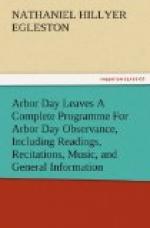And from the gray old trunks that high in heaven
Mingled their mossy boughs, and from the sound
Of the invisible breath that swayed at once
All their green tops, stole over him and bowed
His spirit with the thought of boundless power
And inaccessible majesty. Ah, why
Should we, in the world’s riper years, neglect
God’s ancient sanctuaries and adore
Only among the crowd and under roofs
That our frail hands have raised? Let me, at least,
Here, in the shadow of this ancient wood,
Offer one hymn, thrice happy if it find
Acceptance in His ear.
—Bryant.
JAMES RUSSELL LOWELL.
We can hardly see or think of trees without being reminded of Mr. Lowell, whose death during the last year was so great a loss. He was eminently a lover of trees, and they were the inspiration of some of his best prose and poetry. This love of trees led him to call his pleasant place of residence, in Cambridge, “Elmwood.” In making up our selections for reading or recitation on Arbor Day, the writings of no one have been turned to more often, probably, than those of Mr. Lowell, and it will be very proper if we make this year’s observance distinguished by the abundance of our extracts from his various works. We may well also plant memorial trees in honor of him. No one is more worthy of such honor, and we can hardly do any better thing than to plant trees which shall bear his name and remind us hereafter of his noble words and noble life. And no memorial of him would be more appropriate or more accordant with his own feelings than a growing tree. This is abundantly shown by the following letter, written only a few years ago, when it was proposed in one of our schools, to plant on Arbor Day, a tree in his memory.
“I can think of no more pleasant way of being remembered than by the planting of a tree. Like whatever things are perennially good, it will be growing while we are sleeping, and will survive us to make others happier. Birds will rest in it and fly thence with messages of good cheer. I should be glad to think that any word or deed of mine could be such a perennial presence of beauty, or show so benign a destiny.”
[Illustration]
The oak.
What gnarled stretch, what
depth of shade, is his?
There needs no
crown to mark the forest’s king;
How in his leaves outshines
full summer’s bliss!
Sun, storm, rain,
dew, to him their tribute bring,
Which he, with such benignant
royalty
Accepts, as overpayeth
what is lent;
All nature seems his vassal
proud to be,
And cunning only
for his ornament.




